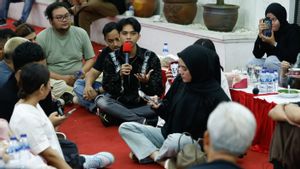JAKARTA - The sentence of two years in prison for the panel of judges at the Palembang Class I District Court, South Sumatra to Lina Mukherjee was highlighted by foreign media. TikTokers with two million followers caused controversy because of the case of eating pork while reading Bismillah.
Lina legally and proven intentionally and without rights disseminate information aimed at creating hatred for certain individuals and community groups based on religion.
Lina's verdict was published on ABC.NET with the title "TikToker Indonesia with more than 2 million followers imprisoned after saying Islamic sentences before eating pork."
Lutfiawati, quoted from ABC.NET, posted a video in March in which she said "Bismillah — an Arabic phrase that means in the name of God — a prayer that is usually spoken by Muslims before taking action. He then started eating pork withgal skin.
In Islam, consuming pork products is considered haram or forbidden. A cleric reported it to the police for a late act, accusing it of "knowingly eating pork skin as a Muslim".
The court also ordered her to pay a fine of Rp250 million for Rupiah. In the video, Lutfiawati, who claims to be a Muslim woman, also admits to being "suggesting" to try pork.
"I know that I was wrong but I didn't expect this punishment," Lutfiawati told a local TV station after the sentence was handed down.
He also asked the court to give him a week to consider the decision, not to rule out the possible appeal. In a court hearing last month, Lutfiawati apologized to "all Indonesians for making a fuss".
Controversial Blasphemy Law
This verdict invites controversy on social media. Many have asked who has actually been harmed by his actions and compared sentences to corruption cases, which are often lighter.
Others say the case is a lesson for influencers and content creators to pay more attention before posting on social media.
Lutfiawati was charged under controversial laws of information and electronic transactions, which include the dissemination of hate or hostility information on ethnicity, religion, and race.
Amnesty International Indonesia Executive Director, Usman Hamid said the article on blasphemy in the law had been misused to target minority and dissident groups.
"This is contrary to Indonesia's international obligations in relation to respect and protection of freedom of thought, conscience and religion or belief, freedom of opinion and expression," he said in a statement.
The law was also used last year when police named several employees of a nightclub as suspects after promotions offering free alcoholic beverages to customers named Muhammad and Maria - or Maria — the name of Jesus' mother.
Alcoholic drinks are also prohibited in Islam and the promotion is considered to be making fun of religion.
Seven years ago, the former governor of Kristen Jakarta, Basuki Tjahaja Purnama, was charged with insulting Islam and being imprisoned after citing a verse from the Qur'an to mock his political opponents in the election campaign.
SEE ALSO:
The English, Chinese, Japanese, Arabic, and French versions are automatically generated by the AI. So there may still be inaccuracies in translating, please always see Indonesian as our main language. (system supported by DigitalSiber.id)














